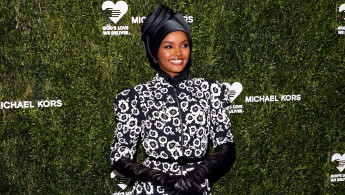'Respect my hijab', Muslim model Halima Aden tells industry as she quits runway
Muslim model Halima Aden has decided to retire from the runway after claiming the industry pressured her into compromising her use of the hijab.
In a heartfelt Instagram story, Aden described the way her spiritual journey sunk as she rose to fame when Rihanna hired her to represent the singer's make-up line Fenty Beauty in 2017.
The Somali-American model later appeared on the catwalk for Max Mara and on the cover of British Vogue, as well as wearing a hijab and burkini in the Sports Illustrated Swimsuit Issue.
Despite her success as a visibly Muslim woman in the modeling industry, she still said she felt pressured to compromise her beliefs by wearing jeans or t-shirts over her head, and posing for shoots where men fix her hijab or apply make-up.
She describes "sobbing" after taking part in one such shoot, where she knew she felt she had conceded her beliefs.
Posting a cover shoot of a photo she was ashamed of, she said: "This wasn't 'representation', this was mockery. I was too young and naive to see it back then."
On her American Eagle Outfitters campaign, where a pair of jeans was placed on her head to cover her hair, she said: "As if we ever needed these brands to represent hijabis. They need us. Never the other way around. But I was so desperate back then for any 'representation' that I lost touch with who I was."
"I can only blame myself for being naive and rebellious," she explained. She added that she is now putting "deen over dunya" (religion over worldly pleasures).
No place like home
Aden said the response to the coronavirus pandemic meant she had spent more time at home and became more introspective of her actions.
"Thanks to Covid-19 and the break away from the industry, I have finally realised where I went wrong in my personal hijab journey," she condided.
Aden said it was her mother who helped guide her back to her true sense of self writing "my mom asked me to quit modelling a long time ago. I wish I wasn't so defensive. Sis was literally the only person who had the purest intentions for me".
Read also: It's time to read about the untold history of revolutionary Muslim women
Soon after Aden posted her story, fellow Palestinian-American model Gigi Hadid showed her support.
And following the post, supermodel Gigi - whose mother, Yolanda Hadid, is Dutch and father, Mohamed Hadid, is Palestinian - has said she is "proud" of her friend for speaking out about her regrets and desire to "get back on track with what feels genuine".
The 25-year-old model wrote on her Instagram Stories: "Everyone should go check out @Halima's story right now.
"It is so important, as a hijabi or not, to self reflect and get back on track with what feels genuine to us - It's the only way to feel truly fulfilled.
"I learnt through therapy once that if we are assertive with our boundaries, it does not mean that we are ungrateful for opportunity, and it will lead to an end result that does not feel hollow, one where we do not feel take advantaged of. Learning that helped me so much."
"My sis Halima, you have inspired me since the day I met you and you continue to make me proud.
"Keep shining, big love. (sic)"
Outpour of support
Aden's story garnered a swarm of reactions from young Muslims who felt inspired by her steadfastness.
"Halima Aden's story is so important because there's not a single Muslim woman that doesn't struggle with the hijab to some degree. Whether we want to admit it or not, societal standards and the beauty industry do influence us and our perception of ourselves," a Muslim woman tweeted.
This sparked discussion about misogyny within the Muslim community and many highlighted the way in which Aden faced cyberbullying for straying from her conservative dress.
"Muslim women are made to feel that they need to constantly explain themselves and their choices. 'Hijab' has become the number one topic within Muslim communities worldwide with men constantly belittling women for not wearing a headscarf or if they do, for not wearing it in the style they deem 'correct'," Muslim writer Yousra Samir and author of Hijabs and Red Lipstick told The New Arab.
"There's this notion some men have that they are the guardians of our bodies and of our 'modesty'. Some men need to learn that when it comes to women and our bodies this is not an arena for their judgement," she added.
Samir explained that the judgmental attitudes remain widespread within the community, meaning that women are only praised for the peaks of their hijab journey and belittled in their perceived troughs.
"It's not just men. There are also some women who constantly belittle other women for choosing not to wear hijab or for not wearing it in a particular way," she added.
Follow us on Facebook, Twitter and Instagram to stay connected





 Follow the Middle East's top stories in English at The New Arab on Google News
Follow the Middle East's top stories in English at The New Arab on Google News
![The UAE is widely suspected of arming the RSF militia [Getty]](/sites/default/files/styles/image_330x185/public/2024-11/GettyImages-472529908.jpg?h=69f2b9d0&itok=Yauw3YTG)
![Netanyahu furiously denounced the ICC [Getty]](/sites/default/files/styles/image_330x185/public/2024-11/GettyImages-2169352575.jpg?h=199d8c1f&itok=-vRiruf5)
![Both Hamas and the Palestinian Authority welcomed the ICC arrest warrants [Getty]](/sites/default/files/styles/image_330x185/public/2024-11/GettyImages-2178351173.jpg?h=199d8c1f&itok=TV858iVg)